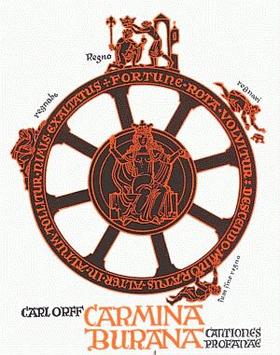No, really.
I mean it.
Recently a friend posted a link. It was hilarious.
Go ahead; click it. I'll wait.
I shared the link on my Face Book page since it unleashed unbridled mirth in me and it seemed selfish not to share it.
When I saw my friend a day or two later, she commented to me about it. I was unable to converse knowledgeably with her, other than to offer effusive thanks for the link. This embarrassed me. (Whether or not it should have shall be a topic for another day.)
I am a reasonably intelligent person, and it was obvious (to me, at least) that I knew little about this famous piece of music. I freely admit that knowledge of classical music is a weak spot for me. I could not allow this situation to continue.
Enter Google and Wikipedia.
Now I know that O Fortuna is a medieval poem that complains about fate, not, as the clip above might lead you to believe, a confusing rant about various foodstuffs and an octopus in boots. It is part of a collection of 254 poems and theatrical texts collectively known as the Carmina Burana, 24 of which which were later set to music by Carl Orff, a German composer.
The pieces were primarily written in Medieval Latin, along with some High German and Provencal. They were collected and bound during the 13th century and later rediscovered in 1803 in a Benedictine monastery in Bavaria. The manuscript is linked to the medieval philosopher Abelard and was likely in his private collection and later passed on to his son, Astrolabe, who lived in the area of the monastery in which it was found.
Many of the writings are satirical and even bawdy. They are attributed to a group of clergy, the Goliards. The Goliards were mostly students who wrote in a particular lyrical style and lampooned the Church, both in writings and in demonstrations. Kind of like the Saturday Night Live of the middle ages.
Carl Orff, a twentieth century German composer, discovered the Carmina Burana and set 24 of the selections to music in his cantata known by the same name. It was first performed in Germany in 1937. Apparently, the Nazi government was a trifle uncomfortable with the sometimes erotic content of the writings, but Orff's composition was so popular that they ultimately embraced it.
Carmina Burana has been widely performed and recorded. If you would like to hear it in its entirety, including O Fortuna, click below, but be warned: you will never hear it the same way after seeing the cartoon!
"Salsa cookies! Windmill cookies! They gave you gonorrhea!"
Thanks, Face Book, for making me smarter!
Next up: how videos of puppies can add years to your life.



Hilarious.
ReplyDeleteTurns out reading blogs makes me smarter.
ReplyDeleteI don't know you, but I think I love you.
ReplyDelete